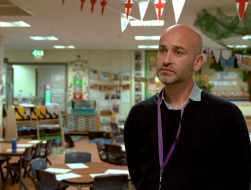Unique school plans have been put in place in ten areas of Manchester to help not only pupils – but their families too.
The new Intensive Support
The 12-month council-funded
The move is also part of a broader five-year action
One school that’s already
Neil is also a qualified teacher and this is how he summarises his role:
“The pandemic was really hard on young children and their families – and it all contributed to some children just not being able to pick up speech and writing skills.
 “To put that in context, we know that children have the biggest learning and development growth between the ages of 3-5. Children at that age during the pandemic are now in our Year 1 and some of them may not have had a sibling or people to play with during isolation and that contributes to missing development milestones.
“To put that in context, we know that children have the biggest learning and development growth between the ages of 3-5. Children at that age during the pandemic are now in our Year 1 and some of them may not have had a sibling or people to play with during isolation and that contributes to missing development milestones.
“So, I spend individual and small group time with the children who need it, while the teacher focuses on the rest of the class. But, I do it in a way that makes it fun for them, so they build up skills in a natural way.
“For example, I use picture images on a sticky board and ask the children the put them into ‘silly sentences’ – where there can be a funny story, which we laugh about, but at the same time the children are unconsciously learning about verbs, sentences structures and clauses without feeling overloaded. Things like that then start a roll of confidence that I can build on with them as the foundations for writing. And, the most important thing is to give immediate feedback so that the children know when they are making that progress.
“If we can help these children catch up on skills development it has benefits in all other areas of learning, behaviour and self-esteem and how they then relate to the rest of their classmates throughout school life.
“It also means I can help and connect into any other services the child might need – like speech therapy. Plus, if the family needs support with learning issues or other areas, I can also be a conduit for that so there is a more holistic approach to the right help, where it is needed.
“It’s amazing when you see that lightbulb moment, when a child makes learning connections.
“And, it’s vital to do work like this right at the outset before the delays in learning become too great, because you have to give children a voice. Writing is a voice – and that’s how they can progress in the world, have something to say and be empowered to bring their creativity to life.”







